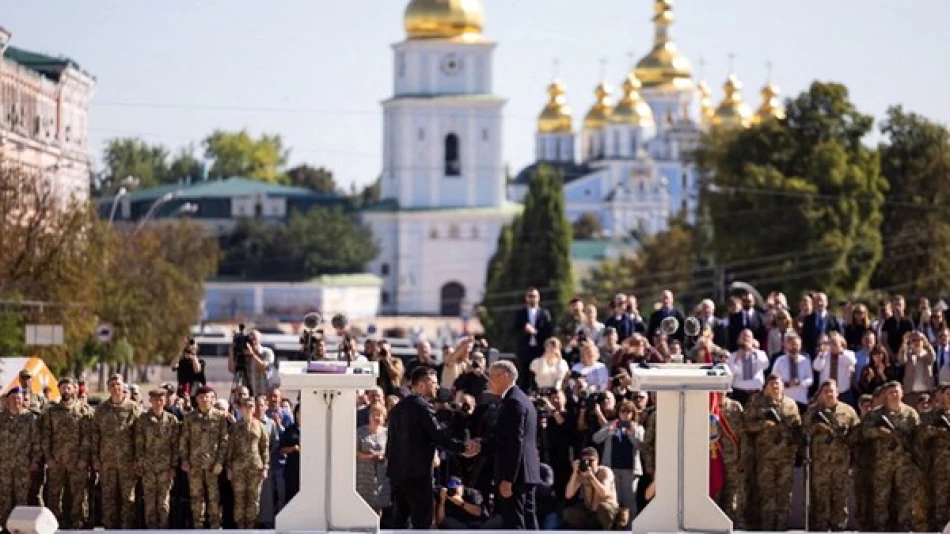
Canadian PM Considers Deploying Troops to Ukraine Amid Growing Tensions
Canada Opens Door to Troop Deployment in Ukraine Peace Framework
Canadian Prime Minister Mark Carney signaled a significant shift in Western security commitments to Ukraine, telling President Volodymyr Zelensky that Canada would not rule out deploying troops as part of future security guarantees in any peace agreement with Russia. The statement represents one of the clearest indications yet that NATO allies are prepared to back Ukraine's post-war security with boots on the ground, not just weapons and financial aid.
Beyond Military Aid: A New Security Architecture
Speaking at a joint press conference in Kyiv, Carney emphasized that Ukraine's armed forces alone cannot provide sufficient security guarantees. "In Canada's assessment, it is not realistic for the only security guarantee to be the strength of the Ukrainian armed forces... which need support and reinforcement," he stated.
This marks a departure from the current Western approach of arming Ukraine while avoiding direct military involvement. Carney's comments suggest that as peace negotiations gain momentum under President Trump's leadership, allies are seriously considering more robust security commitments that could include peacekeeping or deterrent forces.
Concrete Military Support Continues
Alongside these future commitments, Canada announced immediate military assistance. Ukraine will receive over CAD $1 billion ($723 million USD) in military aid next month, part of a previously announced package. The two leaders also signed an agreement for joint drone production, reflecting the war's transformation of military technology and manufacturing partnerships.
Trump's Peace Push Reshapes Allied Strategy
The timing of Carney's visit—his first to Ukraine since taking office in March—coincides with intensifying diplomatic efforts. Trump's special envoy to Ukraine, Keith Kellogg, attended Sunday's Ukrainian Independence Day ceremony in central Kyiv, underscoring Washington's renewed focus on ending the conflict.
This represents a marked shift from the Biden administration's approach. While previous U.S. policy emphasized military aid without explicit post-war security commitments, Trump has expressed openness to security guarantee frameworks that European allies are now actively developing.
NATO Article 5 as the Gold Standard
Zelensky made clear his expectations for any security arrangement, stating he wants guarantees "as close as possible to NATO's Article 5," which treats an attack on one member as an attack on all. This ambitious goal would essentially extend NATO's collective defense principle to Ukraine without formal membership—a compromise that could satisfy both Ukrainian security needs and Russian concerns about NATO expansion.
Historical Precedent and Practical Challenges
Such arrangements have precedent. South Korea has hosted U.S. troops for over seven decades under mutual defense treaties, while various peacekeeping missions have separated hostile forces in conflicts from Cyprus to the Sinai Peninsula. However, Ukraine's situation is unique given Russia's nuclear capabilities and stated opposition to Western military presence on its border.
Market and Geopolitical Implications
For defense contractors and allies, Carney's statement signals potential long-term military commitments that could reshape European security architecture. The joint drone production agreement also highlights how the war is accelerating defense industrial cooperation, creating new supply chains and technological partnerships.
More broadly, the willingness to consider troop deployments suggests Western allies are preparing for a post-war period that may require sustained military presence to deter future Russian aggression. This could fundamentally alter European defense spending and force structure for years to come.
Speaking before an 11th-century cathedral in Kyiv's Sophia Square, Zelensky framed the stakes clearly: ensuring "that the end of this war will mean guaranteeing peace for Ukraine, so that war or the threat of war does not remain for our children to inherit." Whether Western troops will be part of that guarantee may soon move from possibility to policy.
Most Viewed News

 Layla Al Mansoori
Layla Al Mansoori






